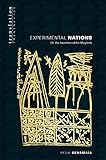Experimental Nations : Or, the Invention of the Maghreb / Réda Bensmaïa.
Material type: TextSeries: Translation/Transnation ; 19Publisher: Princeton, NJ : Princeton University Press, [2009]Copyright date: ©2003Edition: Course BookDescription: 1 online resourceContent type:
TextSeries: Translation/Transnation ; 19Publisher: Princeton, NJ : Princeton University Press, [2009]Copyright date: ©2003Edition: Course BookDescription: 1 online resourceContent type: - 9780691089379
- 9781400825646
- 840.9/961
- online - DeGruyter
- Issued also in print.
| Item type | Current library | Call number | URL | Status | Notes | Barcode | |
|---|---|---|---|---|---|---|---|
 eBook
eBook
|
Biblioteca "Angelicum" Pont. Univ. S.Tommaso d'Aquino Nuvola online | online - DeGruyter (Browse shelf(Opens below)) | Online access | Not for loan (Accesso limitato) | Accesso per gli utenti autorizzati / Access for authorized users | (dgr)9781400825646 |
Frontmatter -- Contents -- Translation Note -- Acknowledgments -- Introduction: Is an "Experimental" Nation Possible? -- 1. Nations of Writers -- 2. Cities of Writers -- 3. Nabile Farès, or How to Become "Minoritarian" -- 4. Postcolonial Nations: Political or Poetic Allegories? -- 5. (Hi)stories of Expatriation: Virtual Countries -- 6. Multilingualism and National "Traits" -- 7. The Cartography of the Nation -- 8. By Way of a Conclusion -- Appendix: Le Dépays: On Chris Marker's Lettre de Sibérie (1957) -- Notes -- Index Nominum -- Index Reum
restricted access online access with authorization star
http://purl.org/coar/access_right/c_16ec
Jean-Paul Sartre's famous question, "For whom do we write?" strikes close to home for francophone writers from the Maghreb. Do these writers address their compatriots, many of whom are illiterate or read no French, or a broader audience beyond Algeria, Morocco, and Tunisia? In Experimental Nations, Réda Bensmaïa argues powerfully against the tendency to view their works not as literary creations worth considering for their innovative style or language but as "ethnographic" texts and to appraise them only against the "French literary canon." He casts fresh light on the original literary strategies many such writers have deployed to reappropriate their cultural heritage and "reconfigure" their nations in the decades since colonialism. Tracing the move from the anticolonial, nationalist, and arabist literature of the early years to the relative cosmopolitanism and diversity of Maghrebi francophone literature today, Bensmaïa draws on contemporary literary and postcolonial theory to "deterritorialize" its study. Whether in Assia Djebar's novels and films, Abdelkebir Khatabi's prose poems or critical essays, or the novels of Nabile Farès, Abdelwahab Meddeb, or Mouloud Feraoun, he raises the veil that hides the intrinsic richness of these artists' works from the eyes of even an attentive audience. Bensmaïa shows us how such Maghrebi writers have opened their nations as territories to rediscover and stake out, to invent, while creating a new language. In presenting this masterful account of "virtual" but veritable nations, he sets forth a new and fertile topography for francophone literature.
Issued also in print.
Mode of access: Internet via World Wide Web.
In English.
Description based on online resource; title from PDF title page (publisher's Web site, viewed 08. Jul 2019)


